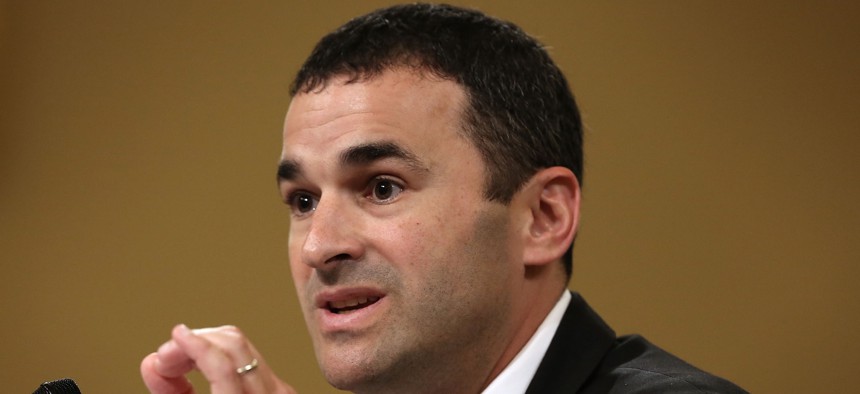Biden’s IRS Pick Says He Wants to Move Agency’s Systems into the 21st Century

Nominee for IRS commissioner Danny Werfel, pictured in 2013, told senators Wednesday that Inflation Reduction Act funding offers "a once-in-a-generation opportunity" to modernize the agency. Alex Wong / Getty Images
Nominee for IRS commissioner Danny Werfel, a self-professed “government geek,” talked customer experience, cybersecurity and IT modernization with senators at a Wednesday hearing.
During a Wednesday nomination hearing before the Senate Finance Committee, President Biden’s pick to head the IRS, Danny Werfel, fielded questions about how he would spend the $80 billion infusion of cash into the agency promised over the next decade.
Technology, Werfel said, will be paramount, fielding questions from lawmakers about legacy systems, cybersecurity and customer service at the IRS and telling them, “We want to move systems into the 21st century.”
The Inflation Reduction Act, passed by Democrats last year, included around $4.8 billion for business systems modernization and $25.3 billion for operations support at the agency.
A flashpoint for Republican lawmakers, Democrats say that the funding can help the IRS lower the tax gap and shore up customer service for taxpayers.
The agency is assembling a plan for the law’s implementation, as requested by Treasury Secretary Janet Yellen, which the IRS plans to deliver this month, according to a recent Government Accountability Office report.
Werfel, a former Fed 100 award winner who currently works in the public sector arm of the Boston Consulting Group, repeatedly told lawmakers that technology will be key to IRS efforts to provide better customer service to taxpayers.
“We have a once-in-a-generation opportunity to put in some of these solutions that will benefit all taxpayers,” he said. "I think there’s an opportunity…. [for] digital solutions, enhancing the functionality of applications on iPhones [and] of the website, so that people find their experience in an electronic format to be extraordinarily helpful.”
His ultimate goal, he said, is for the IRS to actually “be able to beat” private sector benchmarks for customer service.
Lawmakers also posed questions to Werfel about the IRS’ aging tech and modernization efforts.
When asked by Sen. Bill Cassidy (R-La.) whether the IRS should move more systems to the cloud, Werfel said that the “this question about… how to make sure that going forward IRS investments are performing better for taxpayers is front and center in my priorities,” pointing to his previous government experience in assessing technology investments.
A veteran of the Office of Management and Budget, Werfel served as federal and deputy controller, calling himself a “government geek” who has “expertise… on really the nuts and bolts of government” during the hearing.
Werfel has also worked at the IRS itself, where he had a stint as acting commissioner in 2013 after the agency came under scrutiny for its handling of the applications of Tea Party and other conservative groups for tax exempt status.
In terms of cloud tech, Werfel said that moving to the cloud “should absolutely be one of the alternatives that is investigated” but emphasized that he would have to weigh evidence about how best to move forward once he was in the agency itself.
A recent report by the Government Accountability Office found that about 33% of the agency’s applications and 23% of its software was considered legacy tech. An IRS official noted in reply comments for that report that none of high-value assets owned by the IRS are hosted in a cloud environment.
Natasha Sarin, a former counselor to Yellen and deputy assistant secretary for economic policy in the Treasury Department — and now is an associate professor of law at Yale Law School ― told FCW that although her focus at the Treasury Department on work to close the tax gap didn’t center on technology in particular, the IRS’ technology would come up all the time.
"The capacity to do modern data analytics at the agency today,” which could help it target enforcement efforts, “just doesn’t exist,” she said.
Werfel is “walking into a historic opportunity for the agency,” said Sarin. “After decades of underfunding, they have these resources and they’re multi-year resources. That is fantastic. It is also a real challenge of implementation.”
Former IRS commissioner John Koskinen, an Obama nominee, told FCW that the Inflation Reduction Act funding will help the IRS’ “modernization program work more effectively because you can now contract for more than eight or nine months” with the long-term funding.
Werfel also fielded questions from Sen. Mark Warner (D-Va.) about cybersecurity, something the former said would be “one of the first questions I ask” when queried about the cybersecurity of IRS legacy systems.
“What is our baseline right now in terms of our cyber resiliency and cyber performance? What are the risks? As we update the technology or technology backbone, what changes do we need to make,” said Werfel.
Several Republicans asked about data security as well, pointing to ProPublica reporting on the taxes of the most wealthy Americans based on a leak of IRS tax data. Werfel told Sen. Marsha Blackburn (R-Tenn.) that the funding boost from the Inflation Reduction Act “can be used to shore up data security,” something he said would be evident in the forthcoming plan.
Werfel will also have to contend with fallout from findings from a recent study from the Stanford Institute for Economic Policy Research that found that black taxpayers are audited by the IRS at disproportionately high rates because of IRS algorithms.
Werfel called it “very concerning” when asked about it by committee chair Sen. Ron Wyden (D-Ore.), committing to giving the committee more info within 60 days of being confirmed.






